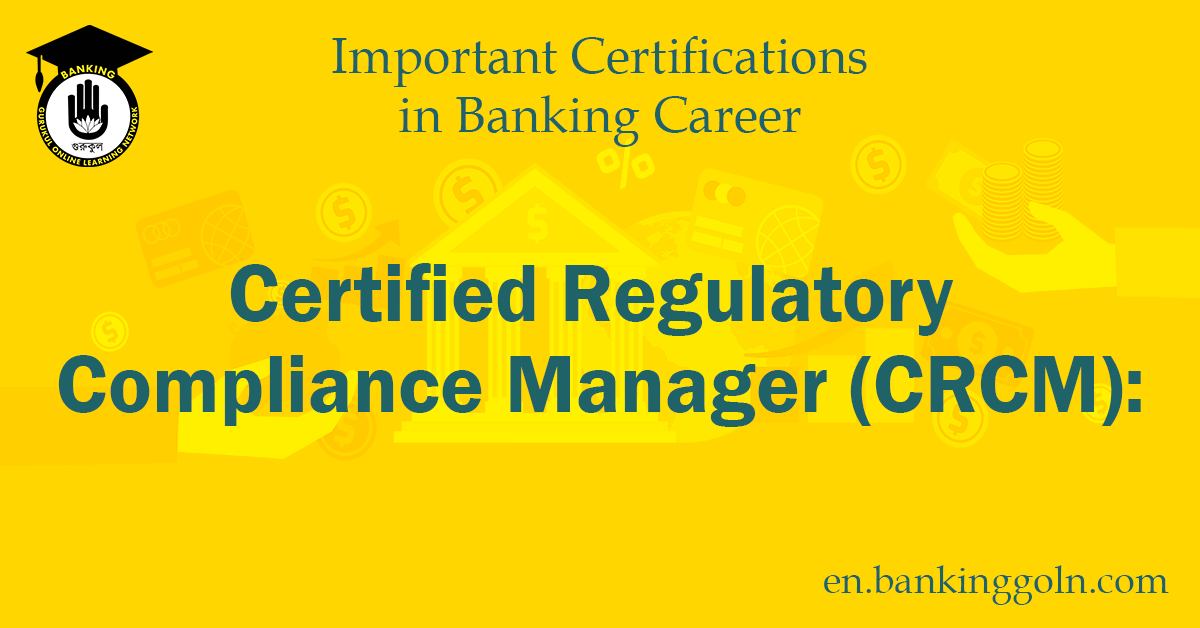In today’s rapidly changing business landscape, regulatory compliance has gained significant importance. Organizations are increasingly seeking professionals who can understand, manage, and lead the implementation of compliance frameworks. The Certified Regulatory Compliance Manager (CRCM) certification is a globally recognized qualification, setting the standard for knowledge and competence in the field of regulatory compliance. This certification is designed for professionals who aspire to excel in managing and coordinating all aspects of an organization’s compliance program.
Certified Regulatory Compliance Manager (CRCM)

What is the CRCM Certification?
The Certified Regulatory Compliance Manager (CRCM) is a certification offered by the American Bankers Association (ABA). This program is designed to provide candidates with comprehensive knowledge and skills in the area of regulatory compliance. CRCM certified professionals are equipped with the expertise to manage and oversee the regulatory compliance functions within a financial institution.
The CRCM certification is regarded as a mark of excellence in the banking and financial services industry. Professionals who hold this certification are recognized for their in-depth understanding of regulatory requirements and their ability to implement effective compliance programs.
The certification is well-regarded across a range of professional domains such as compliance management, risk management, audit, and consulting roles in the banking and financial services sectors. The certification not only enhances the knowledge base of the certified professionals but also aids their career advancement.

Why Pursue CRCM Certification?
In an era where regulatory norms and guidelines are continuously evolving, organizations need competent professionals who can guide them in adhering to these regulations. The CRCM certification is an acknowledgment of an individual’s ability to maintain compliance with these laws and mitigate associated risks.
- Relevance: The CRCM certification stays relevant with the latest regulations and legal requirements in the financial industry. This allows the certified individuals to stay updated with the changing landscape of compliance regulations.
- Career Advancement: The certification is a significant value-add to your resume and sets you apart from your peers. A CRCM certification can open doors to senior roles in compliance, risk management, and audit within the financial sector.
- Industry Recognition: As a globally recognized certification, CRCM holds high value and respect within the industry. It indicates that the professional has attained a level of expertise, knowledge, and competence in the field of regulatory compliance.
- Enhanced Knowledge & Skills: The certification course equips you with the necessary knowledge and skills to effectively manage and implement compliance programs in a financial institution.

Eligibility Criteria for CRCM Certification
The eligibility criteria for the CRCM certification includes both work experience and educational qualifications.
As per the ABA, the candidate must have at least three years of experience in financial services compliance and should have completed certain approved ABA courses. Alternatively, six years of experience in financial services compliance without any ABA courses would also be sufficient. Moreover, a four-year degree from an accredited college or university in a relevant field is required.

The CRCM Exam
The CRCM exam is a multiple-choice question-based test. It includes 200 questions that are to be answered in four hours. The exam tests the candidate’s knowledge and understanding in six domains:
- Banking laws and regulations: This domain covers various banking laws, regulations, and agencies, including the Federal Reserve System and the Office of the Comptroller of the Currency.
- Compliance program management: It involves understanding how to develop, implement, and manage an effective compliance program.
- Compliance monitoring and reporting: This section tests your ability to monitor and report compliance activities, including conducting compliance audits and developing compliance reports.
- Deposit products and operations: It focuses on the regulations related to deposit accounts, electronic banking, and operations.
- Lending compliance: This domain covers the regulations related to various lending products such as mortgage, consumer, and commercial lending.
- Bank operations: This section examines regulations related to bank operations including bank safety, soundness, and technology.
Passing the CRCM exam demonstrates a professional’s knowledge in each of these six domains.

Preparing for the CRCM Exam
The ABA provides various resources to help candidates prepare for the CRCM exam. They offer an online training course, self-study materials, and practice exams. Candidates are advised to study the CRCM Exam Outline and the recommended reading list, which includes various banking laws, regulations, and recent amendments.

Domains
The CRCM advisory board has determined that a competent compliance professional’s expertise includes the following Domains.
- Assessment and Management of Compliance Risk
- Compliance Monitoring
- Governance and Oversight
- Regulatory Change Management
- Regulator and Auditor Compliance Management
- Compliance Analysis and Internal/External Reporting
Please review the CRCM Examination Outline for additional details.
Exam Facts, Scoring and Reporting
- 200 multiple-choice questions
- Maximum 4 hour time frame allowed
- The February and April exams will only cover laws and regulations in effect through 12/31 of the prior year. All other exams after April will cover current laws and regulations.
- Calculators will be provided
- Instant “Pass/Fail” outcome provided for most computer based exams at test sites. Occasionally, instant outcomes are not provided while statistical analysis is conducted.
- Official score reports delivered via email within 6 weeks after the close of the exam window
Certification Exam FAQs:
The following questions are representative of the types of questions you will find on the CRCM (Certified Regulatory Compliance Manager) exam.
1. A borrower has a right to rescind a loan agreement in all of the following situations except:
a. A line of credit used for the borrower’s business, secured by the borrower’s primary dwelling
b. A revolving line of credit secured by the borrower’s primary dwelling used to improve the borrower’s home
c. An increase of a line of credit from $5,000 to $10,000 secured by the borrower’s primary dwelling
d. A loan to pay off a contract for a deed secured by the borrower’s primary dwelling
2. When opening a deposit account online, Regulation E disclosures MUST be provided at the time of account opening or:
a. Before the first EFT occurs
b. Along with the first periodic statement
c. Within three business days of account opening
d. Within three business days of a customer’s request for the EFT service
3. The primary responsibility for overseeing a bank’s inherent compliance risk should lie with which of the following?
a. Internal audit
b. Consumers
c. Board of Directors
d. Compliance officer
4. A branch manager finds an unexplained $7,000 cash shortage in Teller #1’s cash drawer. Which of the following actions must the bank take?
a. File a Currency Transaction Report (CTR) with the IRS
b. Discharge Teller #1 immediately
c. Send a notice of adverse action to the bank’s federal regulator
d. File a Suspicious Activity Report (SAR)
5. A compliance professional recently discovered the bank did not file and disclose an accurate covered agreement, as required by the CRA Sunshine Act. In order to ensure correct reporting in the future, what must be provided?
a. All individual mortgage loans
b. Grants or loans to fulfill CRA activity
c. Non-public or confidential information that will be provided in the public file
d. A copy of the agreement to the regulatory agency 24 months after the end of the term
Maintaining the CRCM Certification
The CRCM certification is valid for three years. To maintain the certification, professionals are required to earn 60 continuing education credits during this period. These can be gained through professional activities, ABA training programs, and self-study. This ensures that certified professionals stay up-to-date with the latest regulatory changes and best practices in the field.

The Impact of CRCM Certification on Your Career
Obtaining the CRCM certification can significantly impact your career in the banking and financial services industry. It can open up opportunities for roles like Compliance Officer, Compliance Manager, Risk Manager, Compliance Analyst, and more. As these roles are crucial in ensuring that organizations adhere to regulatory requirements, they are often well remunerated.
According to Payscale, as of July 2023, the average salary of a CRCM certified professional in the United States is approximately $89,000 per year. However, the salary can vary based on factors like location, years of experience, and the size of the organization.
In conclusion, the CRCM certification is a valuable asset for professionals in the financial sector who are looking to strengthen their knowledge and skillset in regulatory compliance. It not only boosts their career prospects but also makes a significant contribution to the risk management capabilities of their organizations.
See more:
- GOLN Technology in Banking Book: Table of Contents
- GOLN Risk Management In Banking Book: Table of Contents
- GOLN Mobile Banking Book : Table of Contents
- GOLN Cyber Security in Banking Book : Table of Contents
- GOLN Banking & Financial Services Compliance Management Book : Table of Contents
- TOC of Career in Banking
- Certified Regulatory Compliance Manager : American Bankers Association
